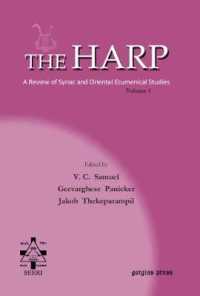- ホーム
- > 洋書
- > 英文書
- > Business / Economics
基本説明
Reviews the legal and administrative aspects of property tax.
Full Description
'The chapters in this book explore in detail the choices regarding both the structure and administration of the property tax, drawing on the extensive knowledge the authors have acquired in studying property taxes around the world. The chapters provide a wide-ranging treatment of the design choices and administrative tasks, both in terms of the breadth of design options and administrative tasks covered and the depth of the discussion. The authors describe the range of design choices, discuss the associated issues and the advantages and disadvantages for each, and present the criteria to help choose among the options.'
From the book's Foreword by David L. Sjoquist, Professor of Economics and Dan E. Sweat Scholar Chair in Educational and Community Policy, Georgia State University
Property taxation is a key element in providing a solid foundation and a stable funding source for basic public services.
Developing and implementing a property tax system is a complex task. This complexity is compounded by the diversity of legal, cultural and historical contexts of policymakers and tax administrators. The World Development Report (1999-2000), Entering the 21st Century puts fiscal decentralization at the top of the development agenda. This makes local taxation - and especially the property tax option - of critical importance to both tax and land policy, as well as the broader development agenda.
A Primer on Property Tax: Administration and Policy provides the reader with an analysis of issues surrounding property tax, including economics, law, public finance, decentralisation, valuation, GIS and property tax reform. A key strength of the book lies in the vast international experience of the authors and the book will provide for the first time material which is topical, cutting-edge and highly relevant to many of the disciplines involved in property taxation.
The authors examine the criteria applied to evaluate the strengths and weaknesses of property tax, discuss the main valuation methods and the economic principles underpinning them and review the legal and administrative aspects of property tax worldwide.
Contents
About the Contributors xi
Foreword by David L. Sjoquist xvii
Introduction xxv
1 Property Tax: A Situation Analysis and Overview 1
Harry Kitchen
Introduction 1
Role for property taxes 2
Importance of the property tax 3
Choice of tax base 3
Issues in assessment 6
Issues with property tax rates 15
Incidence of the property tax 26
Politics of the property tax 33
Future for the property tax 35
Summary 35
References 37
2 Value-Based Approaches to Property Taxation 41
Riël Franzsen and William J. McCluskey
Introduction 41
Overview of property tax bases 42
Value-based approaches 45
Concept of market value 54
Traditional valuation methods 59
Conclusions 63
References 64
3 The Politics of the Property Tax 69
Enid Slack
Introduction 69
Unique characteristics of the property tax 70
Principles for designing the property tax 73
Characteristics of the property tax 73
Property tax revolts, tax limitations and tax relief 79
The politics of property tax reform 81
The property tax as a local tax 83
Conclusion 86
References 87
4 Administration of Local Taxes: An International Review of Practices and Issues for Enhancing Fiscal Autonomy 89
John L. Mikesell
Introduction 89
Central administration 91
Independent local administration 98
The special case of property taxes 106
Conclusion 119
References 121
5 Establishing a Tax Rate 125
Kurt Zorn
Introduction 125
What level of government should set the property tax rate? 126
Types of tax rates 131
Determining the tax rate 133
Who sets the rate? 134
Rate setting in practice 135
Conclusions 138
References 138
6 Property Tax Collection and Enforcement 141
Roy Kelly
Introduction 141
Policy and administrative determinants of property tax revenues 142
Definition of model variables 143
Common reasons for low rates of collection and enforcement 149
Designing an effective property tax collection system 153
Enforcing against noncompliance 161
Summary thoughts 168
References 170
7 The Tax Everyone Loves to Hate: Principles of Property Tax Reform 173
Jay K. Rosengard
Introduction 173
Primary rationale for reform 174
Fundamental principles of reform 176
Strategic choices in reform 178
Policy pitfalls of reform 183
Conclusion 184
References 185
8 Legal Issues in Property Tax Administration 187
Frances Plimmer
Introduction 187
Tax policy 188
Property taxation 192
Uniformity/equity/fairness/treatment of taxpayers 198
Conclusions 204
References 205
9 Tax Criteria: The Design and Policy Advantages of a Property Tax 207
Gary C. Cornia
Introduction 207
Independent and autonomous revenues 209
Adequate and stable revenue 211
Hedging the revenue bets 212
How broad is the tax base? 212
Financial support for infrastructure 214
Capturing the increased value resulting from public infrastructure 214
Immobile base 215
Benefit tax 216
Ability to pay taxes 217
Ease of compliance 218
Ease and cost of administration 219
Transparent taxes 219
Political acceptability 221
Subnational tax systems and horizontal inequity 221
Advantages of the property tax 222
Disadvantages of the property tax 225
Conclusion 226
References 226
10 Estimating Property Tax Revenue Potential 229
Lawrence C. Walters
Introduction 229
Fiscal capacity and fiscal effort 231
Fiscal capacity 231
Estimating aggregate property value 232
Property tax capacity and effort in the OECD 235
Adjusting for undeveloped land 238
Estimating local revenue potential 244
Conclusion 246
References 246
11 Taxing Public Leasehold Land in Transition Countries 249
Yu-Hung Hong
Introduction 249
Public leasehold systems 250
Land ownership and taxation 251
Land rent, property tax and tax incidence 256
Valuing public leasehold for tax purposes 260
Conclusions 261
References 263
12 Property Tax and Informal Property: The Challenge of Third World Cities 265
Martim Smolka and Claudia M. De Cesare
Introduction 265
The phenomenon of informal land occupations 266
Property tax performance in cities with
extensive informality 271
The property tax as a tool for reducing informality 278
Conclusion 283
References 284
13 Non-market Value and Hybrid Approaches to Property Taxation 287
William J. McCluskey and Riël Franzsen
Introduction 287
Non-market valuation approaches 287
Other non-value approaches 293
Hybrid alternatives that use a form of value as the basis for the property tax 293
Flat-rate taxes 301
Conclusions 303
References 303
14 Computer Assisted Mass Appraisal and the Property Tax 307
William J. McCluskey, Peadar Davis, Michael McCord, David McIlhatton and Martin Haran
Introduction 307
Concepts of CAMA and quality control issues 309
Mass appraisal techniques 315
Case study: MRA modelling 326
Conclusions 333
References 334
15 Geographic Information Systems and the Importance of Location: Integrating Property and Place for Better Informed Decision Making 339
David McIlhatton, Michael McCord, Peadar Davis and Martin Haran
Introduction 339
Conclusions 355
References 356
Index 359








